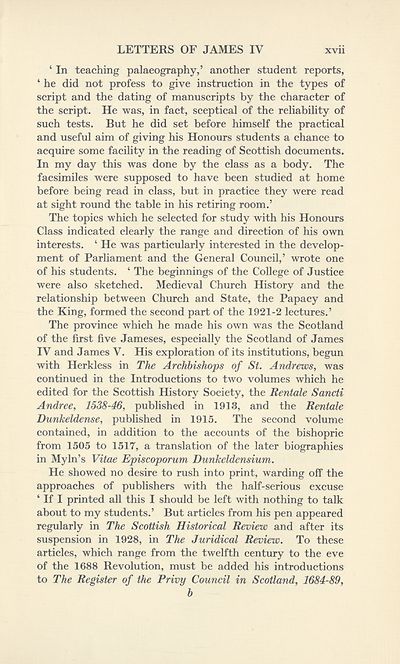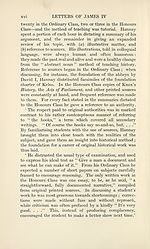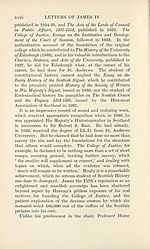Series 3 > Letters of James the Fourth, 1505-1513
(24) Page xvii
Download files
Complete book:
Individual page:
Thumbnail gallery: Grid view | List view

LETTERS OF JAMES IV xvii
‘ In teaching palaeography,’ another student reports,
‘ he did not profess to give instruction in the types of
script and the dating of manuscripts by the character of
the script. He was, in fact, sceptical of the reliability of
such tests. But he did set before himself the practical
and useful aim of giving his Honours students a chance to
acquire some facility in the reading of Scottish documents.
In my day this was done by the class as a body. The
facsimiles were supposed to have been studied at home
before being read in class, but in practice they were read
at sight round the table in his retiring room.’
The topics which he selected for study with his Honours
Class indicated clearly the range and direction of his own
interests. ‘ He was particularly interested in the develop¬
ment of Parliament and the General Council,’ wrote one
of his students. ‘ The beginnings of the College of Justice
were also sketched. Medieval Church History and the
relationship between Church and State, the Papacy and
the King, formed the second part of the 1921-2 lectures.’
The province which he made his own was the Scotland
of the first five Jameses, especially the Scotland of James
IV and James V. His exploration of its institutions, begun
with Herkless in The Archbishops of St. Andrews, was
continued in the Introductions to two volumes which he
edited for the Scottish History Society, the Rentale Sancti
Andree, 1538-46, published in 1913, and the Rentale
Dunkeldense, published in 1915. The second volume
contained, in addition to the accounts of the bishopric
from 1505 to 1517, a translation of the later biographies
in Myln’s Vitae Episcoporum Dunkeldensium.
He showed no desire to rush into print, warding off the
approaches of publishers with the half-serious excuse
‘ If I printed all this I should be left with nothing to talk
about to my students.’ But articles from his pen appeared
regularly in The Scottish Historical Review and after its
suspension in 1928, in The Juridical Review. To these
articles, which range from the twelfth century to the eve
of the 1688 Revolution, must be added his introductions
to The Register of the Privy Council in Scotland, 1684-89,
b
‘ In teaching palaeography,’ another student reports,
‘ he did not profess to give instruction in the types of
script and the dating of manuscripts by the character of
the script. He was, in fact, sceptical of the reliability of
such tests. But he did set before himself the practical
and useful aim of giving his Honours students a chance to
acquire some facility in the reading of Scottish documents.
In my day this was done by the class as a body. The
facsimiles were supposed to have been studied at home
before being read in class, but in practice they were read
at sight round the table in his retiring room.’
The topics which he selected for study with his Honours
Class indicated clearly the range and direction of his own
interests. ‘ He was particularly interested in the develop¬
ment of Parliament and the General Council,’ wrote one
of his students. ‘ The beginnings of the College of Justice
were also sketched. Medieval Church History and the
relationship between Church and State, the Papacy and
the King, formed the second part of the 1921-2 lectures.’
The province which he made his own was the Scotland
of the first five Jameses, especially the Scotland of James
IV and James V. His exploration of its institutions, begun
with Herkless in The Archbishops of St. Andrews, was
continued in the Introductions to two volumes which he
edited for the Scottish History Society, the Rentale Sancti
Andree, 1538-46, published in 1913, and the Rentale
Dunkeldense, published in 1915. The second volume
contained, in addition to the accounts of the bishopric
from 1505 to 1517, a translation of the later biographies
in Myln’s Vitae Episcoporum Dunkeldensium.
He showed no desire to rush into print, warding off the
approaches of publishers with the half-serious excuse
‘ If I printed all this I should be left with nothing to talk
about to my students.’ But articles from his pen appeared
regularly in The Scottish Historical Review and after its
suspension in 1928, in The Juridical Review. To these
articles, which range from the twelfth century to the eve
of the 1688 Revolution, must be added his introductions
to The Register of the Privy Council in Scotland, 1684-89,
b
Set display mode to:
![]() Universal Viewer |
Universal Viewer | ![]() Mirador |
Large image | Transcription
Mirador |
Large image | Transcription
Images and transcriptions on this page, including medium image downloads, may be used under the Creative Commons Attribution 4.0 International Licence unless otherwise stated. ![]()
| Scottish History Society volumes > Series 3 > Letters of James the Fourth, 1505-1513 > (24) Page xvii |
|---|
| Permanent URL | https://digital.nls.uk/126696879 |
|---|
| Attribution and copyright: |
|
|---|
| Description | Over 180 volumes, published by the Scottish History Society, containing original sources on Scotland's history and people. With a wide range of subjects, the books collectively cover all periods from the 12th to 20th centuries, and reflect changing trends in Scottish history. Sources are accompanied by scholarly interpretation, references and bibliographies. Volumes are usually published annually, and more digitised volumes will be added as they become available. |
|---|


